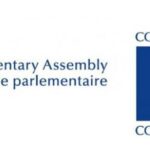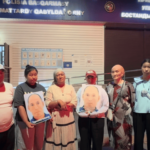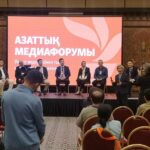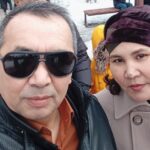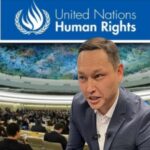To: President of Kazakhstan Nursultant Nazarbaev,
fax number: + 7(7172) 74 55 24
Copy: General Prosecutor’s Office of Kazakhstan,
fax number: + (7172) 71 26 50
Brussels, 27 July 2012
Honorable Mr. President,
I’m writing to you on behalf of International Partnership for Human Rights to express concern with respect to the case of 19-year-old conscript Vladislav Chelah. As you know, he is accused of killing 13 fellow border guards, their commander and a huntsman at the Arkan Kengen temporary border post at Kazakhstan’s border with China at the end of May this year.
According official information, Chelah was arrested on 4 June 2012. He was subsequently
criminally charged with murder (under article 96, 2a of the Criminal Code of Kazakhstan)
on the basis of a confession made during interrogation, where he claimed to have acted out of temporary “confusion”. As reported to us by Kazakhstan International Bureau for Human Rights and Rule of Law (KIBHR), one of the most well-known and respected Kazakhstani human rights groups with which our organization cooperates, Chelah has been held de facto incommunicado during most of his period in detention and denied contacts with his family and lawyers.
Due to concerns that a state-appointed lawyer provided to Chelah was not doing enough to defend his client’s interests, Chelah’s family engaged a private lawyer to work on his case as of 28 June 2012, and KIBHR engaged a second one as of 15 July 2012. Both of these lawyers have been prohibited from visiting Chelah in detention on various pretexts, as well as from communicating with him in other ways. Chelah has also been denied meetings and contacts with his family following a one-time, brief meeting with his mother and uncle on 9 June 2012, which took place in the presence of law enforcement officials and under video recording. Moreover, while Chelah underwent a series of examinations at the Republican Scientific-Practical Center of Psychiatry (RSPCP) in Almaty on 19-24 June 2012, his relatives and lawyers have not been informed about the exact nature or outcome of these examinations. Currently he is held in a detention center in the city of Taldykorgan in the Almaty region.
The circumstances of the case against Chelah indicate that his rights as a defendant have
been unduly restricted in violation of international human rights standards, and that there is reason to fear for his well-being in detention. As emphasized by international human rights bodies, detainees who are deprived outside contacts are highly vulnerable to ill-treatment and torture, including forced psychiatric interventions. Concerns about possible prohibited treatment of Chelah were reinforced after he was finally permitted to see his lawyers on 25 July 2012. During this meeting, he categorically retracted his earlier confession, sayinghe had given it under psychological pressure. Also, after seeing her son in June, Chelah’s mother stated that he had whispered to her while they hugged and kissed that that “he did not do it,” even if he repeated several times during the meeting that he was guilty. In the video recording of this meeting (available on Youtube) Chelah appears seriously frightened. Concerns about Chelah are also reinforced by the many open questions that surround the criminal case against him, including inconsistencies and contradictions in the information presented about the case, as well as the failure by law enforcement authorities to identify any clear motive for his alleged crime.
In this context, we would like to remind you of Kazakhstan’s obligations under international law with respect to the rights of detainees. Article 14 of the International Covenant on Civil and Political Rights (ICCPR, which Kazakhstan ratified in 2006) protects the right of an individual charged with a criminal offense to have “adequate time and facilities for the preparation of his defence and to communicate with counsel of his own choosing,” as well as “not to be compelled to testify against himself or to confess guilt.” The Human Rights Committee, which supervises implementation of the ICCPR, has stated that incommunicado detention should be prohibited as a safeguard against torture and cruel, inhuman or degrading treatment prohibited by article 7 of the treaty, and that lawyers and family members should be granted “prompt and regular access” to detainees. The Committee has also emphasized that legal counsel should be able to communicate with detainees confidentially. Similarly the Body of Principles for the Protection of All Persons under Any Form of Detention or Imprisonment, which has been adopted by the UN General Assembly, safeguards the right of detainees to meet and correspond with their legal counsel and family members, as well as to communicate confidentially with their lawyers. These principles likewise prohibit “taking undue advantage” of the situation of detainees for the purpose of compelling them to confess. Article 13 of the Convention against Torture (to which Kazakhstan acceded in 1998) requires that all allegations of torture and ill-treatment be promptly and impartially examined by competent authorities. Article 15 of the same treaty prohibits invoking any statement which is established to have been made as a result of torture as evidence in legal proceedings.
We urge you to ensure that Vladislav’s Chelah’s rights as a detainee are scrupulously upheld in accordance with international human rights standards. In particular, we urge you to take necessary measures to ensure that:
• his lawyers and family are granted prompt and regular access to him.
• the allegations that he was pressured to confess to the crime of which he is charged
is investigated in a prompt, thorough and impartial manner; his confession is not used
as evidence against him if it is established to have been made as a result of prohibited
treatment; and law enforcement officials responsible for possible ill-treatment in his
case are brought to justice.
• he is granted adequate time and facilities to prepare his defense, including through
confidential and unrestricted communication with his lawyers, and his case is heard
in an open and fair trial where he has the opportunity to effectively challenge the
charges against him.
We thank you for your attention to the issues addressed in this letter.
Sincerely,
Brigitte Dufour
Director of International Partnership for Human Rights
Kazakhstan: Open letter on the case of Vladislav Chelah
28.07.2012







